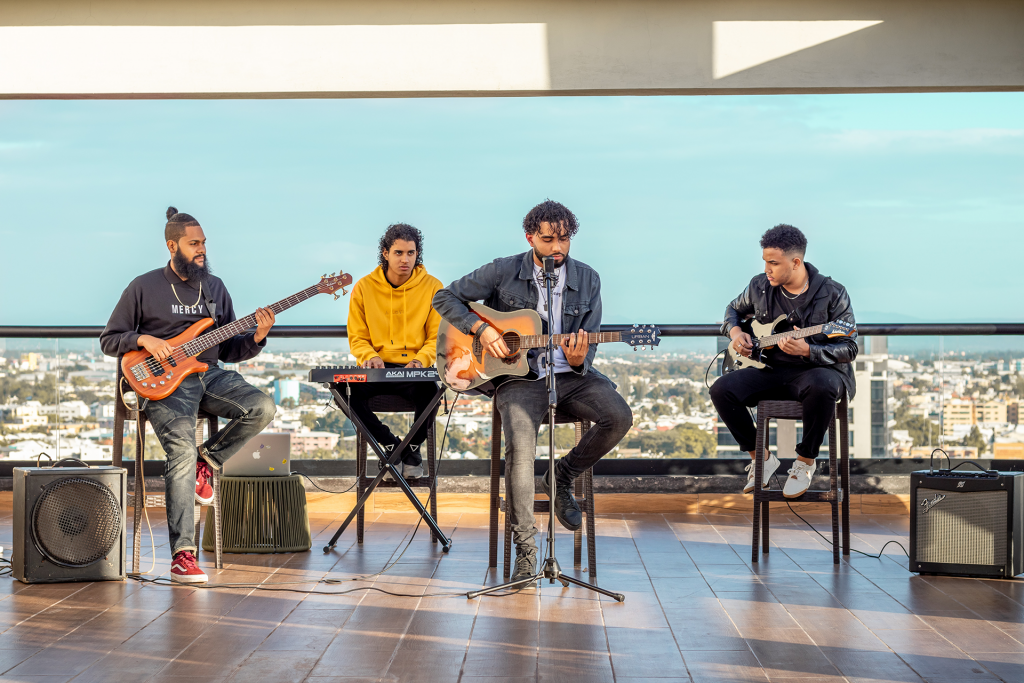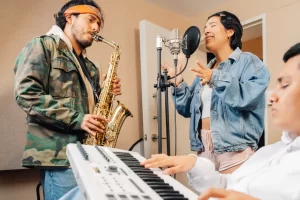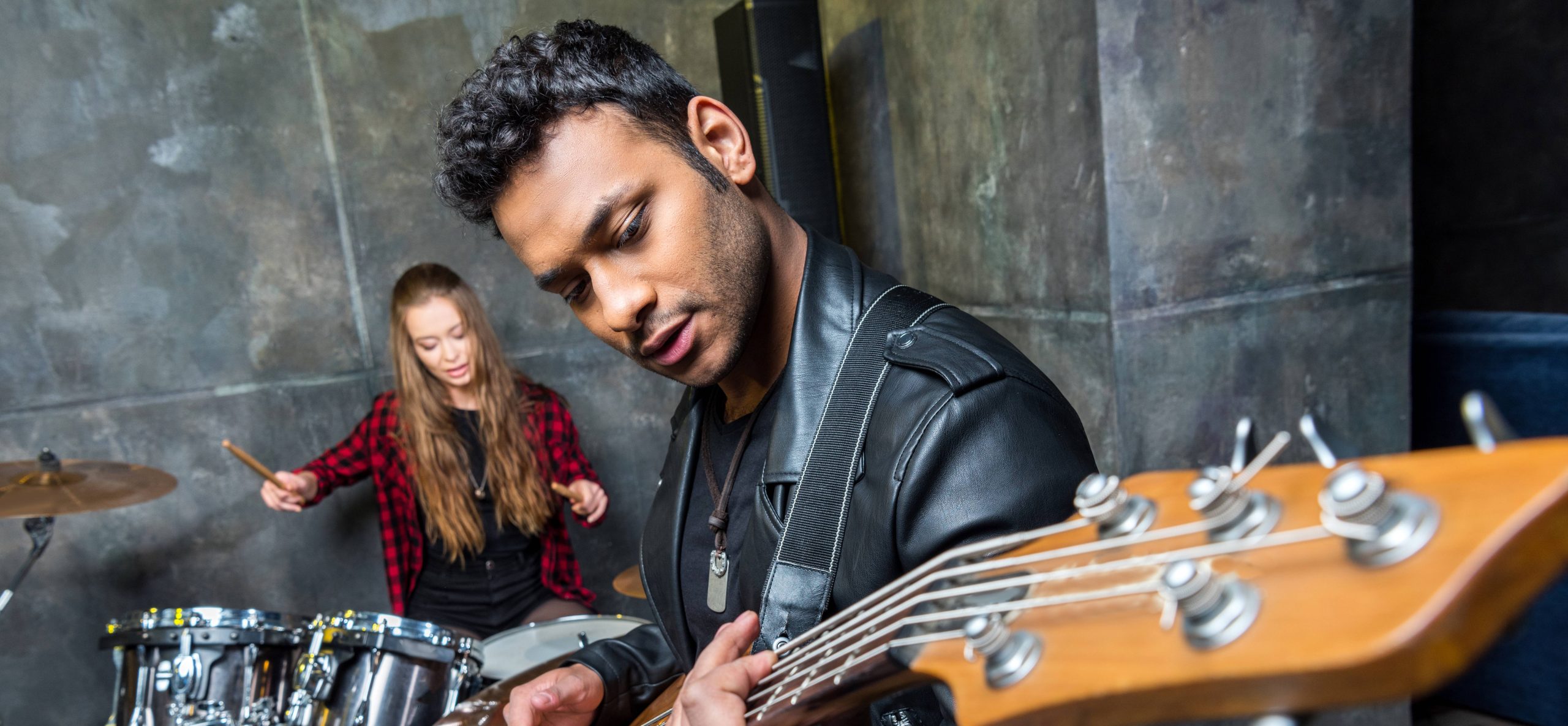Music collaborations can be an incredibly rewarding and enriching experience for artists, providing a unique opportunity to explore new creative territory, learn from others, and expand their audience. When artists join forces, they not only pool their talent and expertise but also create a synergistic effect, often resulting in a final product that transcends the sum of its parts. Collaborations can lead to personal growth, foster lasting relationships within the music community, and contribute to an artist’s career development.
This guide aims to help musicians navigate the process of finding and connecting with other artists for collaborative projects. It will cover essential steps, such as identifying potential collaborators, building relationships through networking, utilizing online platforms, approaching artists with a well-crafted proposal, managing the collaboration process, and promoting the final product. By understanding these key aspects, artists can be better prepared to embark on successful and fulfilling collaborations.
Embracing the spirit of collaboration can open up a world of possibilities for artists, exposing them to different styles, techniques, and perspectives. Ultimately, collaborating with other artists can lead to exciting creative breakthroughs and help musicians make lasting connections that enrich their careers and personal growth in the long run.
Identifying Potential Collaborators
A crucial first step in embarking on a successful collaboration is identifying the right artists to work with. This process involves defining your collaboration goals and objectives, seeking artists with complementary skills and styles, exploring different genres and creative approaches, and researching artists within your local scene and online communities.
Defining your collaboration goals and objectives
Before you start searching for potential collaborators, take the time to clarify your goals and objectives. Are you looking to create a one-time project or establish a long-term partnership? Do you want to experiment with a new genre or enhance your current sound? Having a clear vision of what you hope to achieve through collaboration will help you identify the best artists to work with and guide your search in a focused direction.
Seeking artists with complementary skills and styles
When searching for collaborators, look for artists whose skills and styles complement your own. This could mean working with a producer who can elevate your sound or a vocalist who can bring your lyrics to life. Collaborating with artists who possess strengths in areas where you might need improvement can lead to a balanced partnership and a stronger final product.
Exploring different genres and creative approaches
Collaborations can be an excellent opportunity to step outside your comfort zone and experiment with new genres or creative approaches. By working with artists from different backgrounds and musical styles, you can broaden your horizons, learn new techniques, and create a unique sound that sets your work apart from others.
Researching artists within your local scene and online communities
To identify potential collaborators, start by exploring your local music scene and attending events, gigs, and open mic nights. This will not only help you discover new talent but also allow you to observe their performance style and gauge their compatibility with your vision.
Additionally, join online music communities and forums where you can find artists who share similar interests and goals. Social media platforms like Instagram, Twitter, and Facebook can also be valuable resources for discovering and connecting with other musicians.
By taking the time to define your collaboration goals and thoroughly researching potential partners, you can significantly increase your chances of finding the right artists to work with. This solid foundation will set the stage for a fruitful and fulfilling collaboration experience.
Networking and Building Relationships
Fostering connections with other artists is vital for successful collaborations. Networking and building relationships within the music community can help you find potential collaborators, establish trust, and create a support system that benefits all parties involved. Here are some strategies for networking and building relationships with fellow musicians:
Attending local events, gigs, and music conferences
One of the most effective ways to meet and connect with other artists is by attending local events, gigs, and music conferences. These gatherings provide an opportunity to interact with musicians in person, exchange ideas, and discuss potential collaboration opportunities. Make an effort to attend a variety of events, from small open mic nights to larger industry conferences, to broaden your network and increase your chances of finding suitable collaborators.
Participating in online forums, social media groups, and communities
Online platforms can be a treasure trove of networking opportunities. Engage in conversations on music forums, join social media groups dedicated to your genre or local music scene, and become an active member of online music communities. By participating in discussions and sharing your thoughts, you’ll showcase your expertise, learn from others, and make valuable connections with potential collaborators.
Supporting other artists by attending their shows, sharing their music, and engaging with their content
Building genuine relationships in the music community often starts with supporting fellow artists. Attend other musicians’ shows, share their music on your social media platforms, and engage with their content by leaving thoughtful comments and messages. This not only helps you get noticed but also demonstrates your genuine interest in their work, making it more likely that they’ll be open to collaborating with you.
Establishing genuine connections and fostering mutual support
When networking, focus on building genuine connections rather than merely seeking collaboration opportunities. Show interest in the other artist’s work, ask questions, and share your experiences. A collaborative mindset fosters mutual support, and artists who help each other grow are more likely to form successful partnerships.
By actively networking and building relationships with other musicians, you’ll create a solid foundation for future collaborations. Remember that genuine connections and mutual support are the cornerstones of a thriving music community, so invest your time and energy into nurturing these relationships for lasting success.
Online Platforms for Finding Collaborators
In today’s digital age, there are numerous online platforms that can help you find and connect with other artists for collaborations. These platforms can complement your offline networking efforts and expand your reach, enabling you to discover potential collaborators from around the world. Here are some popular online platforms and strategies for finding collaborators:
Social media platforms
Facebook groups: Facebook groups dedicated to music production, songwriting, and specific genres can be excellent resources for finding potential collaborators. By joining these groups, you can participate in discussions, share your work, and discover artists who are interested in collaborating. Additionally, you can create your own Facebook group to build a community of like-minded musicians and foster collaboration opportunities.
Instagram hashtags and profiles: Instagram is a visual platform that allows artists to showcase their work and connect with fans. By using relevant hashtags in your posts and engaging with other musicians, you can increase your visibility and find potential collaborators. Additionally, follow and interact with artists who inspire you, as they may be open to collaboration or have followers who are interested in working with you.
Twitter conversations and lists: Twitter’s real-time nature makes it an ideal platform for connecting with other musicians and staying updated on industry news. Participate in relevant conversations, use hashtags related to your genre, and create lists of artists you’d like to collaborate with. Engaging with other musicians on Twitter can help you build relationships and discover potential collaborators.
Music collaboration websites and apps
SoundBetter: SoundBetter is a global platform that connects musicians with producers, session musicians, and other music professionals. Artists can create profiles, showcase their work, and browse through listings to find potential collaborators. By joining SoundBetter, you can access a vast network of professionals, making it easier to find the right fit for your project.
Vampr: Vampr is a mobile app designed to help musicians find and connect with other artists for collaborations. The app features a Tinder-like interface, allowing users to swipe through profiles of potential collaborators based on their musical interests and location. By using Vampr, you can quickly discover and connect with musicians in your area or worldwide.
Kompoz: Kompoz is an online platform for musicians and songwriters to collaborate on projects remotely. Users can upload their work, invite others to contribute, and find potential collaborators by browsing through profiles and listening to samples of their work. Kompoz offers a unique opportunity for artists to work together, regardless of their location, and create music collaboratively.
Leveraging streaming platforms to discover potential collaborators
Streaming platforms like Spotify and SoundCloud can also be valuable resources for finding potential collaborators. By exploring playlists, following artists, and engaging with their content, you can discover musicians who share similar interests and might be interested in collaborating.
By utilizing these online platforms and strategies, you can expand your network of potential collaborators and increase your chances of finding the right artists to work with on your projects. Remember to approach these platforms with an open mind and a willingness to engage with others, as building genuine connections is key to successful collaborations.
Approaching Potential Collaborators
Once you’ve identified potential collaborators through networking and online platforms, the next step is to approach them with a well-crafted proposal. Your approach should be personalized, respectful, and clearly demonstrate the mutual benefits of collaboration. Here are some tips for approaching potential collaborators effectively:
Crafting a personalized and respectful introduction:
When reaching out to potential collaborators, begin with a personalized introduction that shows you’ve taken the time to research and understand their work. Mention specific aspects of their music or projects that resonated with you and explain why you think they would be a good fit for collaboration. Be respectful of their time and ensure your message is concise and to the point.
Showcasing your work and emphasizing mutual benefits:
To pique the interest of potential collaborators, provide samples of your work that highlight your unique skills and style. Share relevant tracks, videos, or demos that demonstrate your talent and show them what you bring to the table. Emphasize the mutual benefits of collaboration, such as expanding each other’s audience, learning new techniques, or creating a unique sound.
Being open to feedback and flexible with collaboration ideas:
When discussing potential collaboration ideas, be open to feedback and willing to adjust your plans to accommodate the other artist’s input. This demonstrates that you value their perspective and are committed to creating a partnership where both parties can contribute equally. Flexibility and a willingness to compromise are essential traits for successful collaboration.
Respecting the other artist’s time and creative process:
Collaborations can be time-consuming and require a significant investment of energy and resources from both parties. Be respectful of the other artist’s time and creative process, and avoid pressuring them to commit to a collaboration immediately. Allow them the space to consider your proposal, ask questions, and determine if the partnership is a good fit for them.
By approaching potential collaborators with a well-crafted, personalized, and respectful proposal, you can increase your chances of securing a successful partnership. Remember that collaboration is a two-way street, and being open to feedback, flexible with your ideas, and respectful of the other artist’s time and creative process will lay the groundwork for a fruitful working relationship.
Managing the Collaboration Process
Once you’ve successfully connected with a fellow artist and agreed to collaborate, it’s essential to effectively manage the collaboration process to ensure a smooth and successful project. This involves establishing clear communication, setting expectations and goals, dividing responsibilities, and maintaining a positive and supportive working environment. Here are some tips for managing the collaboration process:
Establishing clear and consistent communication:
Effective communication is crucial to the success of any collaboration. Set up regular check-ins, either in person, through phone calls, or via video conferencing, to discuss progress, address any issues or concerns, and share feedback. Establishing open lines of communication will help prevent misunderstandings and keep the project on track.
Setting expectations and goals:
Before starting the collaboration, take the time to discuss your expectations and goals for the project. This includes defining the scope of the collaboration, agreeing on a timeline, and establishing milestones to track progress. Having a clear understanding of each other’s expectations will help you work more efficiently and ensure that both parties are on the same page.
Dividing responsibilities and delegating tasks:
To ensure a balanced and productive partnership, divide responsibilities and delegate tasks based on each artist’s strengths and expertise. This can include assigning roles such as songwriting, production, mixing, and mastering, or coordinating promotional efforts. By clearly defining each artist’s responsibilities, you can work more efficiently and avoid potential conflicts.
Maintaining a positive and supportive working environment:
Collaborations can be challenging, particularly when working with different personalities and creative approaches. It’s essential to maintain a positive and supportive working environment where both artists feel comfortable sharing ideas and providing feedback. Encourage open communication, practice active listening, and be willing to compromise to foster a collaborative atmosphere.
By effectively managing the collaboration process, you can ensure a smoother and more successful project. Remember that open communication, clear expectations, and a supportive working environment are key to a fruitful collaboration. Embrace the challenges and rewards of working with other artists, and enjoy the unique creative journey that collaboration offers.
Promoting and Celebrating the Collaboration
After completing your collaborative project, it’s important to maximize its impact and reach by leveraging your combined audience and resources. This involves creating a well-planned release strategy, promoting the collaboration across various platforms, and engaging with your fans and followers. Here are some tips for maximizing the impact of your collaboration:
Developing a release strategy
Before releasing your collaborative project, develop a release strategy that outlines the steps you’ll take to ensure its success. This includes setting a release date, planning a promotional campaign, and deciding on the distribution channels you’ll use. Consider synchronizing your efforts with your collaborator to amplify the reach of your promotion and engage both of your audiences.
Promoting the collaboration across multiple platforms:
To reach the widest possible audience, promote your collaboration across various platforms such as social media, music streaming services, and your websites or blogs. Share teasers, behind-the-scenes content, and snippets of the project to generate interest and anticipation. Collaborate on the creation of promotional content, such as videos, images, and interviews, to showcase your partnership and provide a unique perspective on the project.
Engaging with your fans and followers:
Engage with your fans and followers by sharing updates on the collaboration, responding to comments and messages, and encouraging them to share their thoughts on the project. This not only strengthens your connection with your audience but also increases the likelihood of them sharing your collaboration with their network, further expanding its reach.
Evaluating the success of your collaboration
After the release of your collaborative project, evaluate its success by tracking various performance metrics, such as streams, downloads, social media engagement, and press coverage. Discuss the results with your collaborator and identify areas where you can improve for future collaborations. Reflect on the experience and learn from it to strengthen your collaborative skills and grow as an artist.
By maximizing the impact of your collaboration, you can leverage the combined power of your audiences and resources to reach a wider audience and increase the visibility of your project. Remember that a well-planned release strategy, effective promotion, and active engagement with your fans and followers are key to ensuring the success of your collaborative efforts.
Conclusion
Music collaborations offer artists a unique opportunity to combine their talents, skills, and resources to create innovative projects that can reach a wider audience and elevate their careers. By networking and building relationships, utilizing online platforms, effectively approaching potential collaborators, and managing the collaboration process, you can form successful partnerships that will enrich your artistic journey and contribute to your growth as a musician.
In addition to the practical aspects of collaboration, remember that the process is also an opportunity for personal and creative growth. Embrace the challenges and rewards that come with working with other artists, and allow yourself to learn from their perspectives and experiences. By doing so, you’ll not only create successful collaborative projects but also develop a deeper understanding of your own artistic identity and aspirations.
As you continue to explore the world of music collaborations, remember that patience, persistence, and a willingness to learn are key to forming lasting and fruitful partnerships. With the right mindset and approach, you’ll be able to connect with like-minded artists, expand your creative horizons, and embark on exciting collaborative ventures that will leave a lasting impact on your music career.




